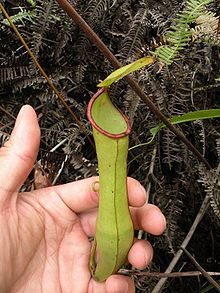| Nepenthes × sharifah-hapsahii | |
|---|---|

| |
| An upper pitcher of N. × sharifah-hapsahii from Pahang, Peninsular Malaysia | |
| Scientific classification | |
| Kingdom: | Plantae |
| Clade: | Tracheophytes |
| Clade: | Angiosperms |
| Clade: | Eudicots |
| Order: | Caryophyllales |
| Family: | Nepenthaceae |
| Genus: | Nepenthes |
| Species: | N. × sharifah-hapsahii
|
| Binomial name | |
| Nepenthes × sharifah-hapsahii | |
| Synonyms | |
|
| |
Nepenthes × sharifah-hapsahii (/nɪˈpɛnθiːz ʃɑːˈriːfə hɑːpˈsɑːiaɪ/) is a natural hybrid between N. gracilis and N. mirabilis.[3][4][5] It has been recorded from Borneo, Peninsular Malaysia, Sumatra, and Thailand,[6][7][8][9][10][11] although it was originally described as a species (N. sharifah-hapsahii) endemic to Peninsular Malaysia, where it was said to grow at elevations below 1000 m.[citation needed]
The type material of N. × sharifah-hapsahii was collected by J. H. Adam on the grounds of the Universiti Kebangsaan Malaysia campus on August 2, 2001. Both the holotype (JHA 8000) and isotype are deposited at the university's herbarium.[citation needed] The taxon was named after the Universiti Kebangsaan Malaysia Vice Chancellor, Professor Dato' Dr. Sharifah Hapsah Syed Hasan Shahabudin.[citation needed]
Nepenthes × ghazallyana (/nɪˈpɛnθiːz ɡəˌzɑːliːˈænə/, after Ghazally Ismail)[12] is a heterotypic synonym of N. × sharifah-hapsahii.[4]
Description
The stem of this hybrid is cylindrical, glabrous, and may climb to a height of 5 m. Leaves are leathery in texture, lanceolate or oblong in morphology, and 9 to 20 cm long. Tendrils may be up to 20 cm long. Pitchers are infundibulate in the lower and upper portions and tubular in the middle. They measure up to 15 cm in height and 3.5 cm in width. The peristome is cylindrical and 1 to 2 mm thick. It bears distinct inner teeth and ribs. The lid is orbiculate and covered with numerous glands on the lower surface. N. × sharifah-hapsahii has a racemose inflorescence, the axis of which is 30 to 35 cm long. The female inflorescence is unknown at present.[citation needed]
Identification
Nepenthes × sharifah-hapsahii most closely resembles N. gracilis. The table below shows characters that distinguish these two taxa, according to Adam and Hafiza.[citation needed]
Morphological characters Nepenthes × sharifah-hapsahii Nepenthes gracilis Shape of upper stem Cylindrical Triangular or angular Lamina base Attenuate into petiole like region and the base not decurrent but clasping stem for about half its circumference Not attenuate into petiole like region and the base decurrent, wings extend almost over one internode Distribution of nectar glands on lower lid surface Numerous nectar glands distributed all over lower lid surface Nectar glands scarcely distributed on lower lid surface Type of digestive glands on inner wall cavity of pitcher Overarched glands: prominently covered by extended epidermal roof conceal more than half of the glands Exposed glands: epidermal roof covering digestive glands poorly developed exposed almost all part of the glands Peristome ribs Distinct Inconspicuous Pedicels 2-flowered on lower 2/3 and 1-flowered on upper 1/3 part of male raceme All 1-flowered
Adam and Hafiza also noted that N. × sharifah-hapsahii is somewhat similar to N. tobaica, from which it differs in several aspects of leaf and inflorescence morphology. Unlike N. tobaica, N. × sharifah-hapsahii has overarched glands on the inner pitcher wall, one-flowered pedicels on the upper third of the male raceme, and numerous longitudinal veins on the lamina.[citation needed]
References
- ^ a b Adam, J.H., C.C. Wilcock & M.D. Swaine 1992. The ecology and distribution of Bornean Nepenthes. Archived 2011-07-22 at the Wayback Machine Journal of Tropical Forest Science 5(1): 13–25.
- ^ Macfarlane, J.M. 1908. Nepenthaceae. In: A. Engler. Das Pflanzenreich IV, III, Heft 36: 1–91.
- ^ McPherson, S.R. 2009. Pitcher Plants of the Old World. 2 volumes. Redfern Natural History Productions, Poole.
- ^ a b Schlauer, J. N.d. Nepenthes × sharifah-hapsahii Archived 2011-06-17 at the Wayback Machine. Carnivorous Plant Database.
- ^ Rice, B.A. 2006. Do you want to tell me about a species I missed? The Carnivorous Plant FAQ.
- ^ Clarke, C.M. 1997. Nepenthes of Borneo. Natural History Publications (Borneo), Kota Kinabalu.
- ^ Clarke, C.M. 2001. Nepenthes of Sumatra and Peninsular Malaysia. Natural History Publications (Borneo), Kota Kinabalu.
- ^ (in Italian) Catalano, M. 2010. Nepenthes della Thailandia: Diario di viaggio. Prague.
- ^ McPherson, S.R. & A. Robinson 2012. Field Guide to the Pitcher Plants of Borneo. Redfern Natural History Productions, Poole.
- ^ McPherson, S.R. & A. Robinson 2012. Field Guide to the Pitcher Plants of Peninsular Malaysia and Indochina. Redfern Natural History Productions, Poole.
- ^ McPherson, S.R. & A. Robinson 2012. Field Guide to the Pitcher Plants of Sumatra and Java. Redfern Natural History Productions, Poole.
- ^ Adam, J.H. & C.C. Wilcock 1995. A new natural hybrid of pitcher plant from Sabah, Malaysian Borneo. Borneo Sci. 1: 1–7.
- Clarke, C.M. 2006. Introduction. In: Danser, B.H. The Nepenthaceae of the Netherlands Indies. Natural History Publications (Borneo), Kota Kinabalu. pp. 1–15.
- (in Indonesian) Enjelina, W. 2012. Analisis hibrid alam kantung semar (Nepenthes) di Bukit Taratak Kabupaten Pesisir Selatan Sumatera Barat dengan teknik RAPD. M.Sc. thesis, Andalas University, Padang.
- (in Indonesian) Mansur, M. 2007. Keanekaragaman jenis Nepenthes (kantong semar) dataran rendah di Kalimantan Tengah. [Diversity of lowland Nepenthes (kantong semar) in Central Kalimantan.] Berita Biologi 8(5): 335–341. Abstract








